
Want a website that delivers results? AI-powered templates are changing how businesses build websites, offering tools that boost conversions by up to 300%. Unlike static designs, these templates analyze visitor behavior, personalize content in real-time, and automate A/B testing to maximize performance.
AI templates save time, reduce costs, and deliver higher ROI. With features like automated testing, predictive analytics, and mobile optimization, these tools help businesses stay competitive in a digital-first world.
AI website templates stand out because they use real user data to evolve and improve. Unlike static designs that stay the same after launch, these templates analyze visitor behavior, demographics, and engagement to make smart, real-time design adjustments.
The secret sauce? Data-driven optimization. AI-powered templates assess how users interact with elements like buttons, images, and layouts, then tweak designs to boost conversions. Take Unbounce's Smart Builder, for example - it uses machine learning to deliver insights that helped companies like Hootsuite and Dropbox increase landing page conversions by up to 25%.
Another game-changer is automated A/B testing. Traditional A/B testing requires manual setup and can take weeks to yield results. AI templates, on the other hand, test multiple variables simultaneously, quickly identifying what works best. This continuous testing paves the way for personalized and predictive strategies.
Real-time personalization is another major advantage. By analyzing visitor data - such as demographics, browsing habits, and device usage - AI templates can tailor content to individual users. This approach has been shown to boost conversions by 25% or more. For instance, North Face used AI-driven personalization to create tailored shopping experiences, which led to a 60% jump in click-through rates.
These templates also excel at scaling customized experiences. Sephora, for example, uses AI for virtual product trials and personalized recommendations, which increased user engagement by 30% and improved conversions by 11%.
Mobile optimization is equally crucial, especially since 85% of American adults own smartphones, and 76% have made mobile purchases. AI templates automatically adjust layouts, improve loading speeds, and streamline navigation for mobile users. This is critical, as even a one-second delay in load time can slash conversions by up to 20%.
The impact of these features is clear in real-world examples. Pam Shih, Team Lead CRM at KoRo Handels GmbH, shared:
"The AI Item Recommendations feature has been instrumental in driving a remarkable 3X increase in our purchase rates."
Predictive analytics further enhance performance by anticipating user needs and delivering timely content. In March 2023, health brand 8Fit used Braze Predictive Suite to target high-potential visitors, boosting conversions by 3.75 times.
AI templates also integrate seamlessly with tools like HubSpot, Salesforce, Google Analytics, and Facebook Ads, streamlining marketing workflows. For example, the ecommerce brand émoi émoi generated over 8,000 leads in a single campaign using AI-powered tools.
When you combine automated testing, personalization, mobile optimization, and predictive analytics, the results can be transformative. In fact, 74% of companies using AI-powered landing page builders report higher conversion rates. These templates aren't just about aesthetics - they're about delivering results that directly impact the bottom line.
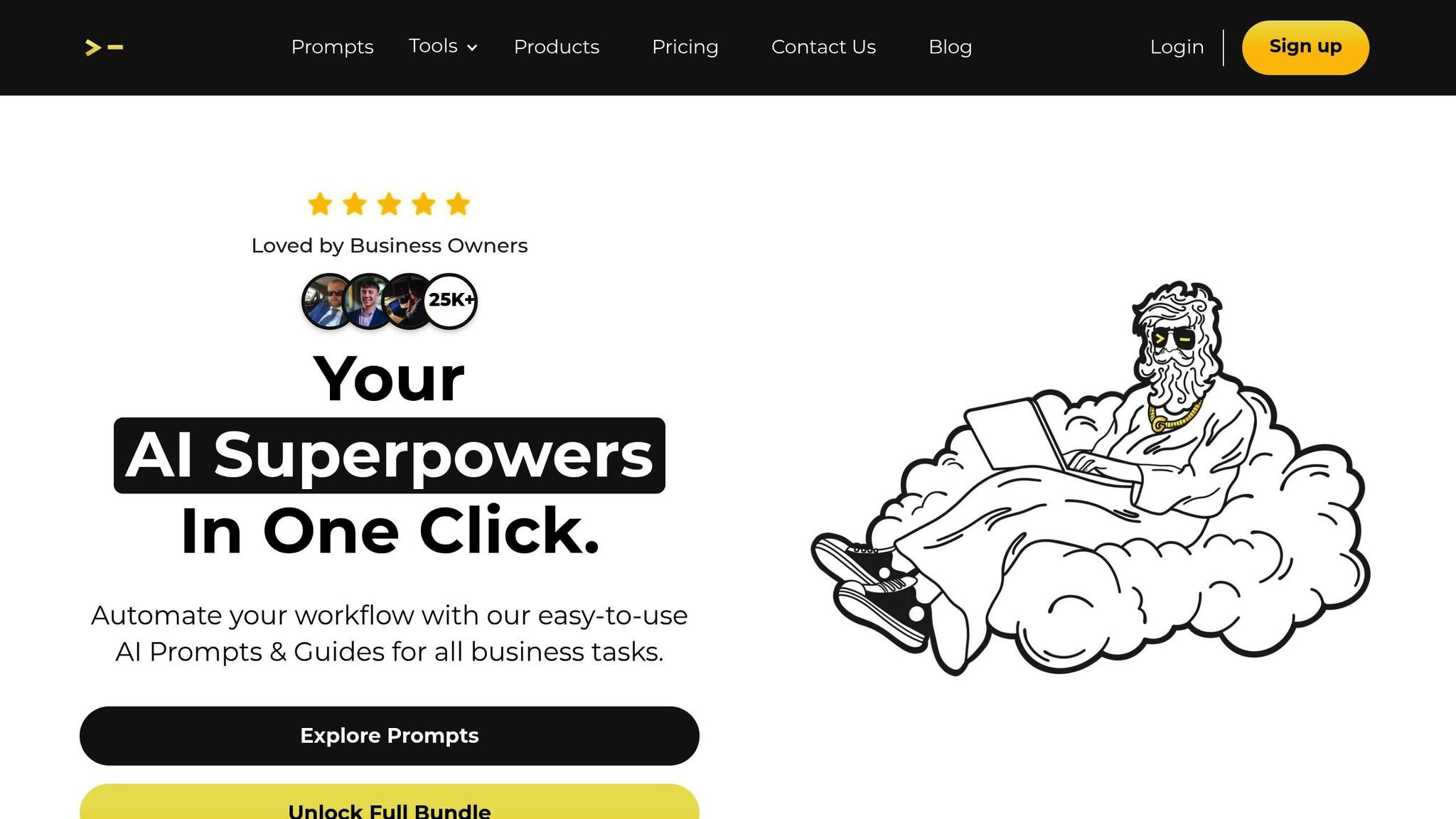
The God of Prompt Conversion Accelerator combines AI-generated prompts with conversion-focused design to create web experiences that truly engage users. By tapping into the God of Prompt's massive library of over 30,000 AI prompts, this template is designed to help businesses build websites that convert visitors into customers effortlessly.
With access to over 30,000 AI-generated prompts, this tool enables you to craft personalized copy that speaks directly to your audience. Whether you're targeting new visitors or nurturing relationships with returning customers, the content adapts to meet their needs.
This accelerator is built to work seamlessly with key tools used by US-based businesses. It connects with AI-powered CRMs to handle tasks like lead management, customer segmentation, and automated communication effortlessly. Additionally, it integrates with popular payment gateways such as Stripe and PayPal, ensuring a smooth and secure checkout process for customers. By combining real-time personalization with efficient data capture and payment processing, this system simplifies operations for businesses in the US.
Designed with mobile users in mind, the template is fully optimized for smartphones and tablets. It also meets ADA compliance standards, automatically generating alt text and maintaining proper color contrast ratios to ensure an inclusive experience for all users. This focus on accessibility makes it easier for everyone to interact with your site, regardless of their device or abilities.
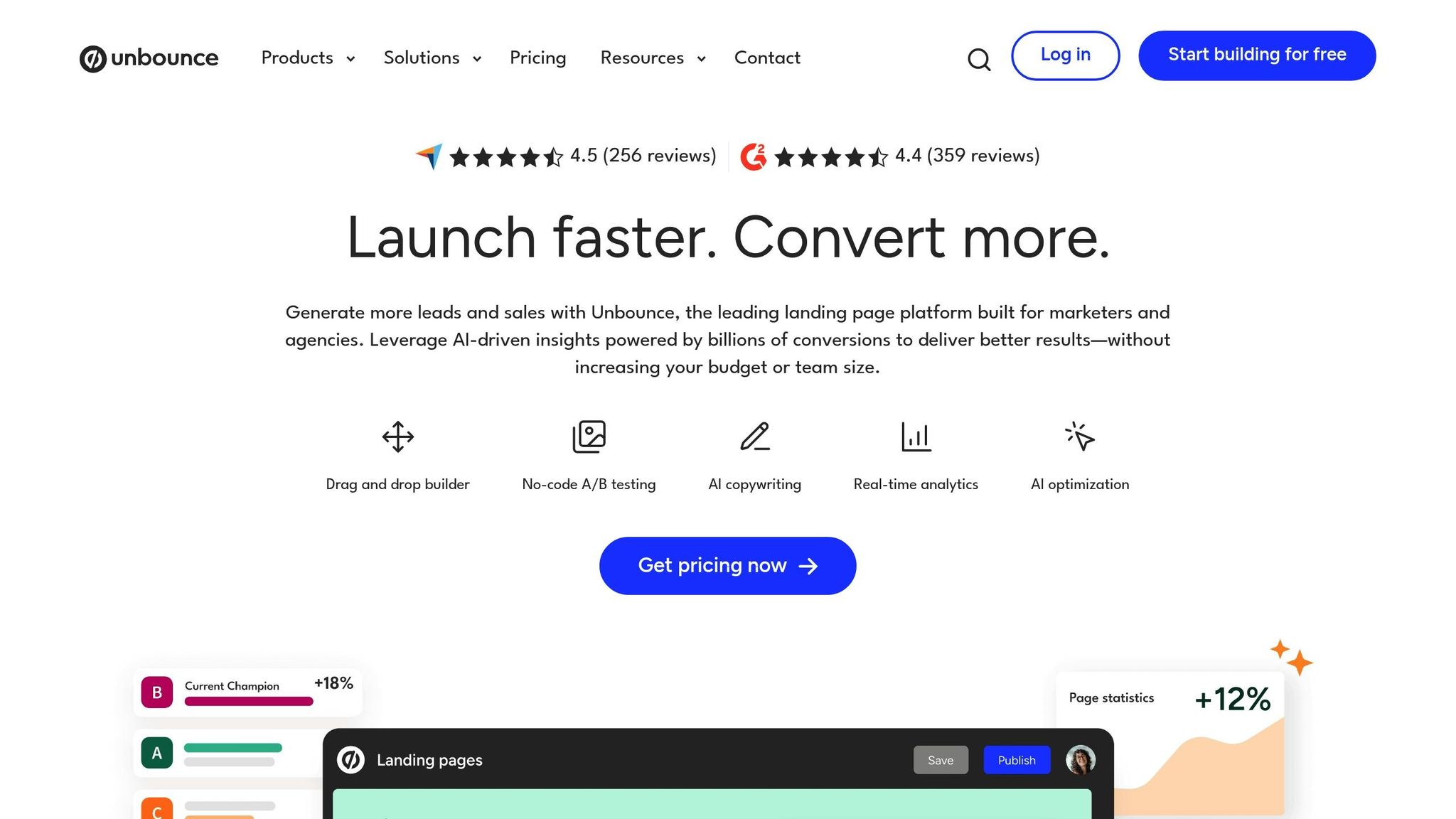
Unbounce Smart Builder is a tool designed to create landing pages that drive results. By using AI, it optimizes visitor experiences and helps improve conversion rates - all without requiring any coding skills, thanks to features like no-code A/B testing.
With Unbounce, you can split traffic among different page variations to test key elements like headlines, images, call-to-action buttons, layouts, and special offers. A real-time reporting dashboard tracks important metrics - such as conversion rates, click-through rates, and form submissions - making it easy to determine which version performs best, complete with confidence intervals.
One standout feature is Smart Traffic, which automatically directs visitors to the page variation most likely to convert. It does this by analyzing factors like location, device type, and other attributes. This dynamic routing can boost conversion rates by an average of 30% and starts showing results after just 50 visits.
For example, the travel company Going saw triple-digit growth in conversions simply by tweaking their call-to-action button with a three-word change.
"Unbounce allows us to quickly turn around landing pages and run A/B tests without having to pull a developer onto a project" – Matt Gardner, Director of Customer Success at RouteThis
Unbounce doesn’t just focus on optimization - it also integrates with a wide range of tools, making it a powerful addition to marketing workflows.
Unbounce Smart Builder works effortlessly with major platforms used by US businesses. It connects to CRMs like Salesforce, HubSpot, and Insightly, email marketing tools such as Mailchimp, ActiveCampaign, and Klaviyo, and analytics solutions like Google Analytics and Hotjar. It also supports communication apps like Twilio, LiveChat, and CallRail. Plus, with Zapier and webhooks, it can integrate with over 5,000 additional apps.
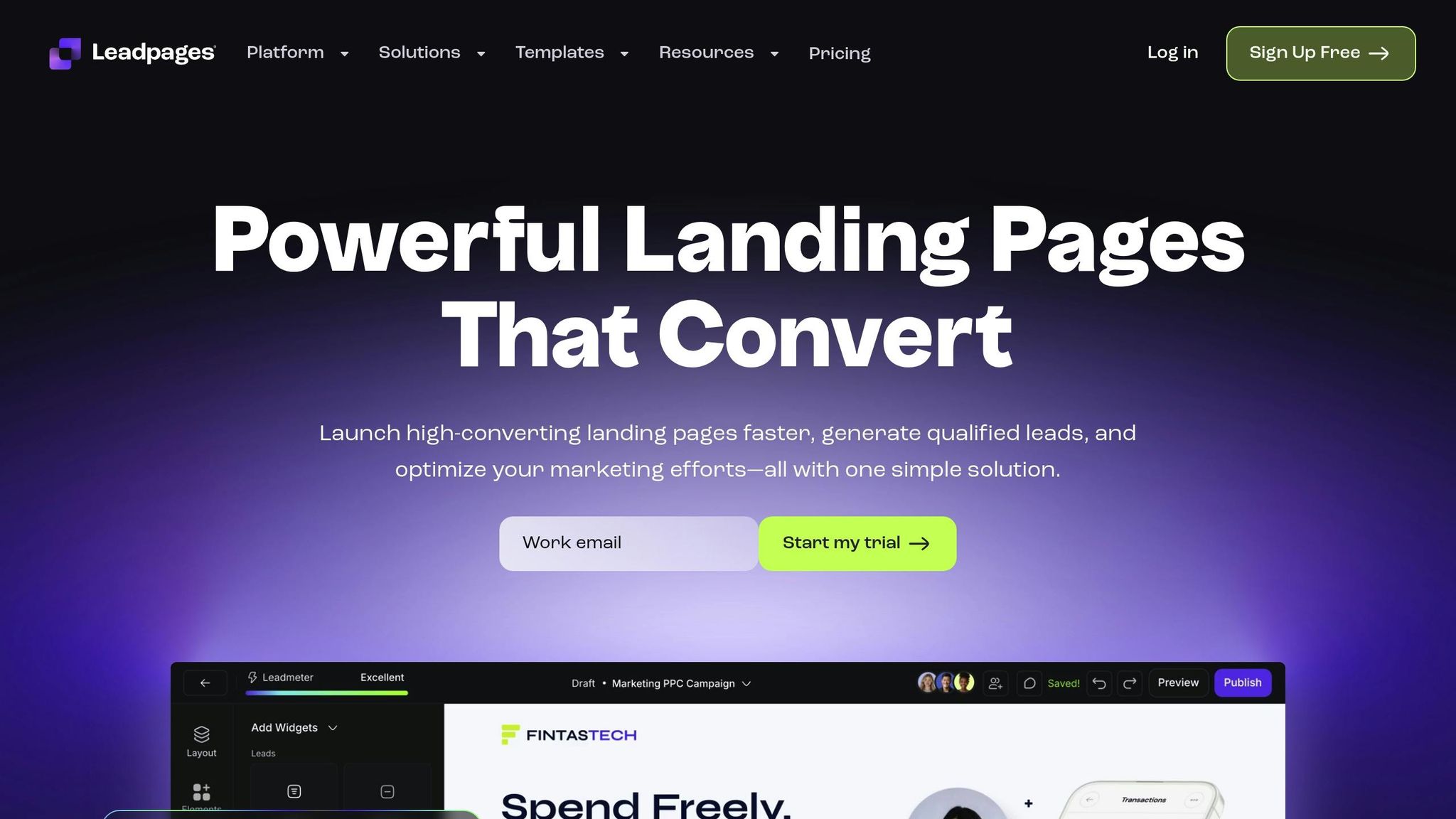
Leadpages AI Templates use machine learning to create landing pages that adjust to users in real time. Unlike traditional static designs, these templates rely on behavioral data and predictive analytics to deliver content that aligns with individual preferences, leading to noticeably higher conversion rates.
These templates monitor visitor behavior - like clicks and time spent on a page - to predict future actions by analyzing both past and real-time data. This allows marketers to fine-tune their strategies more effectively. The AI customizes key elements of the page to match each visitor's preferences. With natural language processing (NLP), it also generates text that feels relevant and tailored to the user. Additionally, recommendation engines enhance the experience by suggesting products, services, or articles that align with individual interests. This dynamic personalization also sets a solid foundation for conducting effective split-tests.
Pro and Advanced plan users can run unlimited A/B tests, tweaking various page elements and refining their approach using real conversion data. The platform runs these tests quickly, pinpointing the most effective content combinations. For instance:
On average, companies using A/B testing see a 20% rise in conversion rates, with some experiencing gains as high as 300%.
"Leadpages just makes marketing easier, which means we spend less time building campaigns and more time building our business." - Nicki Krawczyk, Founder, Filthy Rich Writer
Leadpages integrates smoothly with many popular tools used by businesses in the US, ensuring that lead data flows seamlessly into existing marketing and sales systems. It supports major CRM platforms like Salesforce, Pardot, PipeDrive, Keap Max Classic, and Zoho CRM. For email marketing, it connects with services like Mailchimp, ActiveCampaign, AWeber, Campaign Monitor, Constant Contact, ConvertKit, Drip, GetResponse, and Klaviyo. This means leads captured through AI-optimized templates can be directly added to campaigns.
Additionally, Leadpages supports payment processing through PayPal, Stripe, and Gumroad, allowing businesses to collect payments directly from their landing pages. For tracking and analytics, it integrates with tools like Google Analytics, Google Tag Manager, and Hotjar. Plus, its Zapier compatibility opens the door to thousands of additional app integrations.
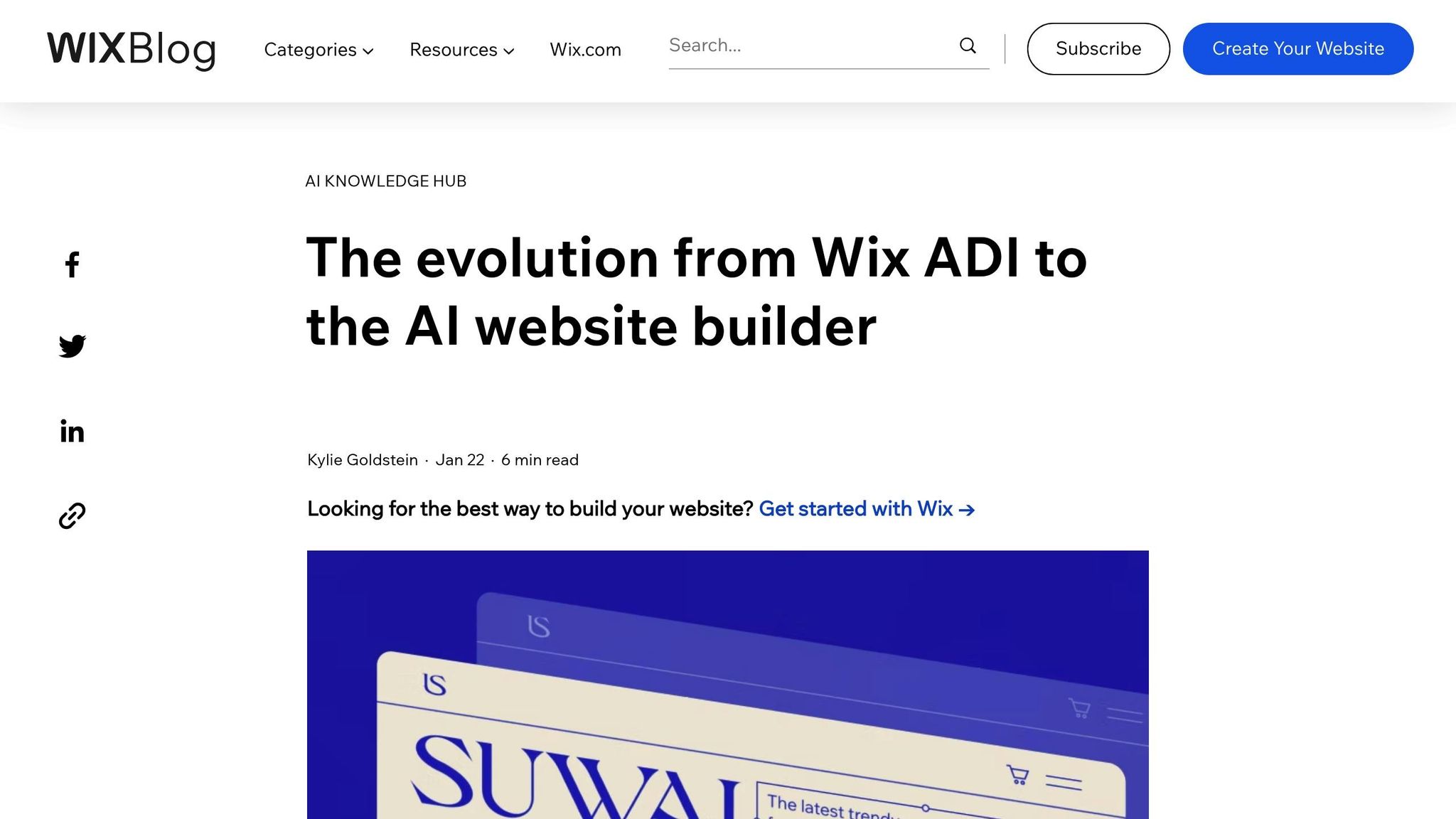
Wix ADI is an intuitive tool that uses artificial design intelligence to create custom websites. By asking a series of targeted questions, it generates a site tailored to your specific needs, making the design process quick and straightforward.
With mobile traffic accounting for 56% of online visitors, Wix ADI ensures that every site it creates is fully mobile-responsive. It uses flexible images, fluid grids, and other responsive design principles to deliver a seamless experience across devices.
Accessibility is another key focus. Wix ADI adheres to WCAG 2.0 standards, offering features like keyboard operability, optimized DOM structures, and smart semantic tagging. These enhancements make navigation easier for users relying on screen readers, ensuring inclusivity for a broader audience.
Wix ADI doesn’t stop at design - it comes equipped with tools tailored for US businesses. Built-in CRM tools, accessible at both the workspace and site level, make managing leads simpler. For payments, Wix Payments supports various methods and is designed for businesses operating in USD, eliminating the hassle of third-party payment integrations. Additionally, Wix integrates with over 80 payment providers globally and offers a wide selection of third-party apps through the Wix App Market.
To streamline lead management, users can easily import contacts via CSV or Gmail. For accessibility, the built-in Accessibility Wizard helps site owners identify and fix potential issues.
With over 180 million users worldwide and premium plans starting at $4.40 per month, Wix ADI is a practical choice for businesses looking to simplify operations and boost online conversions.

Shopify's AI-powered storefronts are transforming e-commerce by creating shopping experiences that adjust in real time to each visitor's preferences and behaviors. These templates are designed to increase conversions through personalized interactions.
Shopify's AI engine uses customer data to craft personalized product recommendations, making the shopping journey more engaging. By combining data from online stores, physical locations, and social platforms into a single customer profile, Shopify delivers tailored experiences that drive results.
Take Olive & Piper, for example. By integrating LimeSpot's AI with Shopify, they provided personalized product suggestions, which led to a 35% rise in conversions during their busiest season. Similarly, Campus Protein implemented customized bestseller lists and saw their conversions double year over year.
"Our commerce-focused AI empowers entrepreneurs like you to be more creative, productive, and successful than ever before." - Shopify Staff
The AI tracks browsing habits, purchase histories, and stated preferences to deliver these recommendations. Stores leveraging this feature have reported up to a 35% boost in conversion rates and a 15% increase in average order value.
Shopify Sidekick, the platform's AI assistant, plays a critical role by connecting data points to reveal opportunities and provide actionable insights for marketing, inventory, and customer experience strategies. It also automates relevant content delivery throughout the customer journey, ensuring higher engagement and conversions. Next, we’ll explore how these insights feed into A/B testing and optimization.
Although Shopify's built-in A/B testing tools are limited, the platform integrates effortlessly with third-party apps that offer robust testing features. These tools allow businesses to test variations in product pages, pricing, checkouts, and other key elements to identify what works best.
In 2023, Swanky Agency helped a shoe brand improve its product page click-through rates by 5% and boost revenue per user by 26% by swapping a small corner badge for a full-width sale banner. Similarly, Pulse Boutique tested adding clear icons to mobile add-to-cart buttons, resulting in a 25% increase in revenue per user and a 14% jump in conversion rates. Businesses that adopt systematic A/B testing strategies often see improvements of 10–25% in critical metrics.
Shopify stands out for its ability to integrate with over 100 payment providers worldwide, while also offering native payment processing options. These include cash, credit and debit cards, contactless payments, mobile wallets, and Buy Now, Pay Later options through Shop Pay Installments. The platform supports USD and connects seamlessly with major US payment gateways.
For American businesses, Shopify's unified commerce approach provides clear advantages. According to EY research, companies using platforms like Shopify POS experience a 22% improvement in total cost of ownership and implement solutions 20% faster. By synchronizing product, inventory, sales, and customer data across online and offline channels, Shopify ensures a seamless experience.
"The interaction between physical and digital should feel like a natural part of your customer experience. To do that, you need your systems to speak the same language. That's why we use Shopify POS." - Juliana Di Simone, tokyobike's Partner and Director
Key integrations include Rep AI for product discovery, Insider for personalized customer journeys, and HubSpot for CRM management. These tools are easily accessible through the Shopify App Store, allowing for quick and secure implementation.
Shopify's AI also extends to inventory management. For instance, LegalOn, an AI tool integrated with Shopify, accurately predicted a 47% spike in demand for linen dresses. This insight helped a retailer reallocate inventory, avoiding $2 million in dead stock and reducing stockout-related losses by 32%.
Shopify templates are built to deliver a flawless experience across all devices. Additionally, AI-powered chatbots provide round-the-clock customer support and personalized recommendations. During Black Friday 2024, retailers using these chatbots saw a 15% increase in conversion rates.
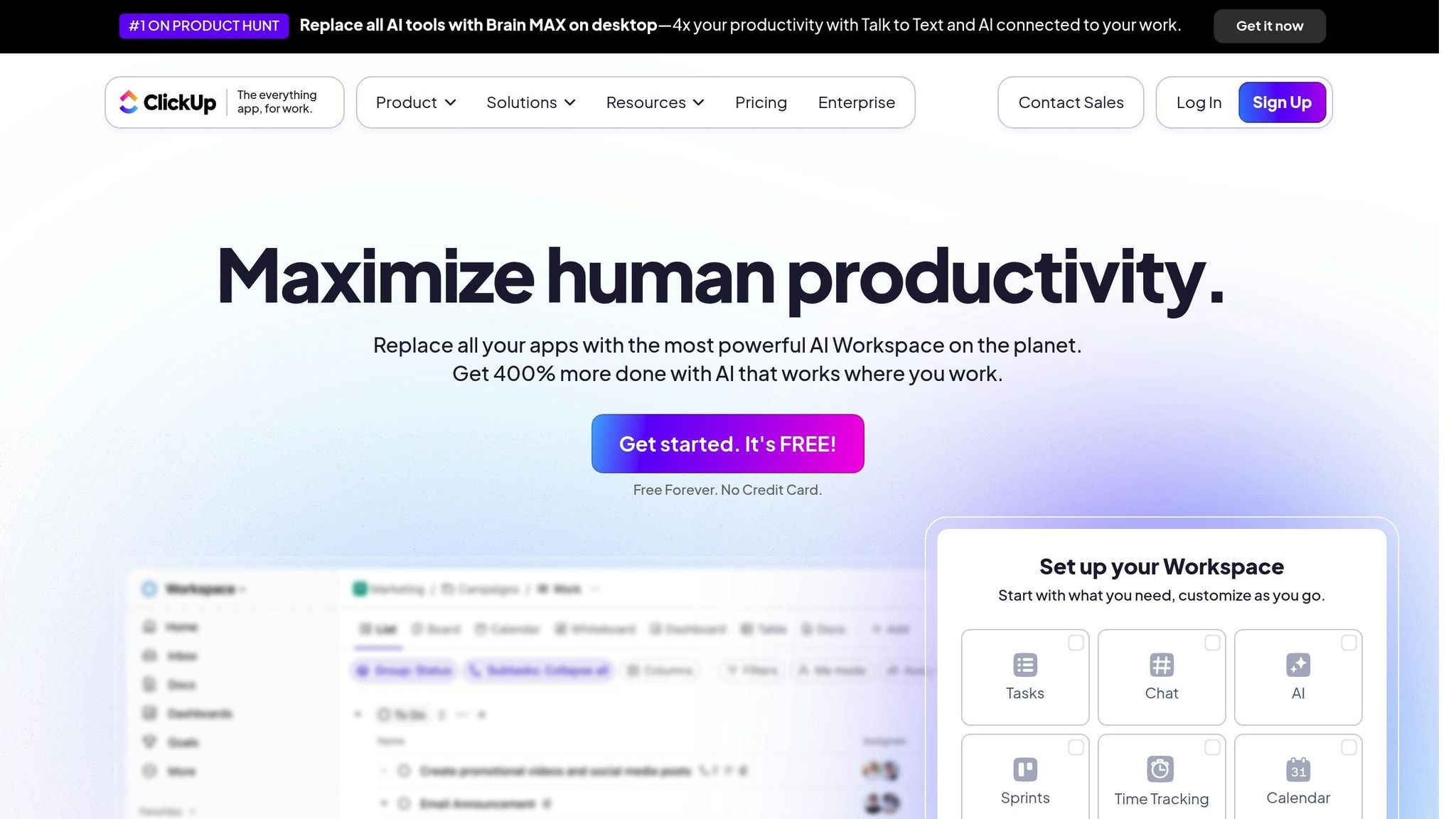
ClickUp's CRO Prompts Template takes conversion rate optimization (CRO) to the next level by combining AI-driven testing with structured experimentation. It's more than just a tool for building websites - it’s a resource designed to help you experiment with data-backed strategies to improve conversion rates. With its focus on testing and strategic implementation, this template is a game-changer for anyone looking to refine their CRO efforts.
ClickUp integrates real-time data analysis to enhance designs while prioritizing strategic content creation. Its AI-powered tools generate targeted A/B testing ideas, allowing you to refine layouts, copy, and design elements. The included A/B Testing Template comes with custom fields to track crucial metrics like progress, test outcomes, version details, and conversion rates. Plus, the AI can craft compelling product descriptions tailored to your audience, making it easier to test and identify which combinations work best. Beyond website design, ClickUp AI also enhances email marketing by generating engaging copy that inspires action and drives results.
ClickUp goes beyond testing by offering a comprehensive approach to CRO. Its tools help you develop detailed strategies that include key tactics, tools, and techniques to improve website performance and boost conversions. Additionally, ClickUp AI supports content creation, helping you overcome writer’s block and ensuring every opportunity for optimization is addressed. This combination of strategy and execution drives ongoing improvement and helps you achieve measurable results.
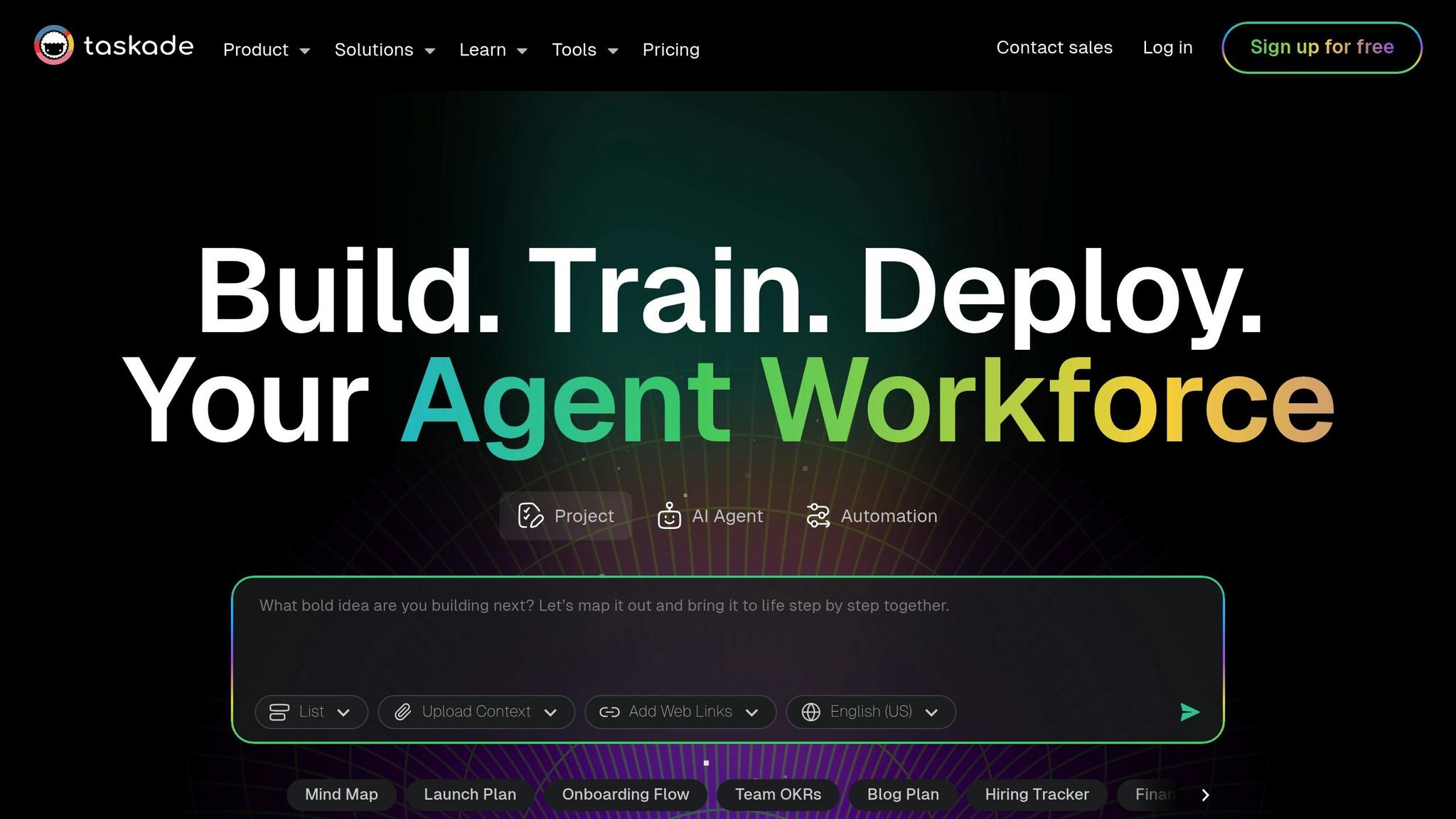
Taskade’s Conversion Rate Optimization (CRO) Checklist takes website optimization to the next level with its AI-driven framework. Unlike many other tools, this checklist ensures no optimization detail is overlooked. Designed for U.S. businesses aiming to boost their conversion rates, it blends strategic planning with automated testing to deliver results.
Taskade’s AI A/B Testing Generator eliminates guesswork by providing clear, data-backed insights. It compares two variations of a webpage - like headlines, call-to-action buttons, or images - to determine which performs better. This allows businesses to test strategies side by side while the AI monitors user behavior and offers actionable recommendations to increase engagement and drive conversions.
Another standout feature is the AI Automated Testing Agent Generator, which creates custom testing agents that mimic user interactions. These agents help identify coding errors and ensure websites perform smoothly and convert efficiently. This streamlined testing approach ensures reliable performance and integrates effortlessly with essential business tools.
Taskade doesn’t stop at testing - it also connects with a wide range of tools critical for U.S. businesses. Through Pabbly Connect, the platform integrates with over 2,000 apps, including popular CRM systems, payment platforms, and marketing tools that support conversion optimization.
For instance, Taskade works seamlessly with major U.S. CRM platforms like Agile CRM, HubSpot CRM, and Salesforce. A practical example? When a new lead is generated via Facebook Lead Ads, Taskade can automatically create a task to follow up on that prospect. On the payment side, integrations with Razorpay allow completed payments to trigger task completions automatically. Additionally, the platform connects with Google Sheets for tracking data, Gmail for managing communications, and WooCommerce for enhancing e-commerce operations.
| Integration Category | Popular U.S. Tools | Automation Examples |
|---|---|---|
| CRM Systems | HubSpot CRM, Salesforce, Agile CRM | Automatically create follow-up tasks for new leads |
| Payment Processing | Razorpay | Mark tasks as complete upon payment confirmation |
| Communication | Gmail, Slack, Twilio | Send notifications for key conversion events |
| E-commerce | WooCommerce | Monitor and recover abandoned carts |
Taskade’s CRO checklist prioritizes mobile responsiveness, which is increasingly vital as mobile commerce continues to grow in the U.S. The platform’s testing agents simulate mobile user interactions to ensure conversion paths are smooth across all devices and screen sizes. This focus on mobile optimization not only enhances user experience but also boosts engagement and performance on smaller screens.
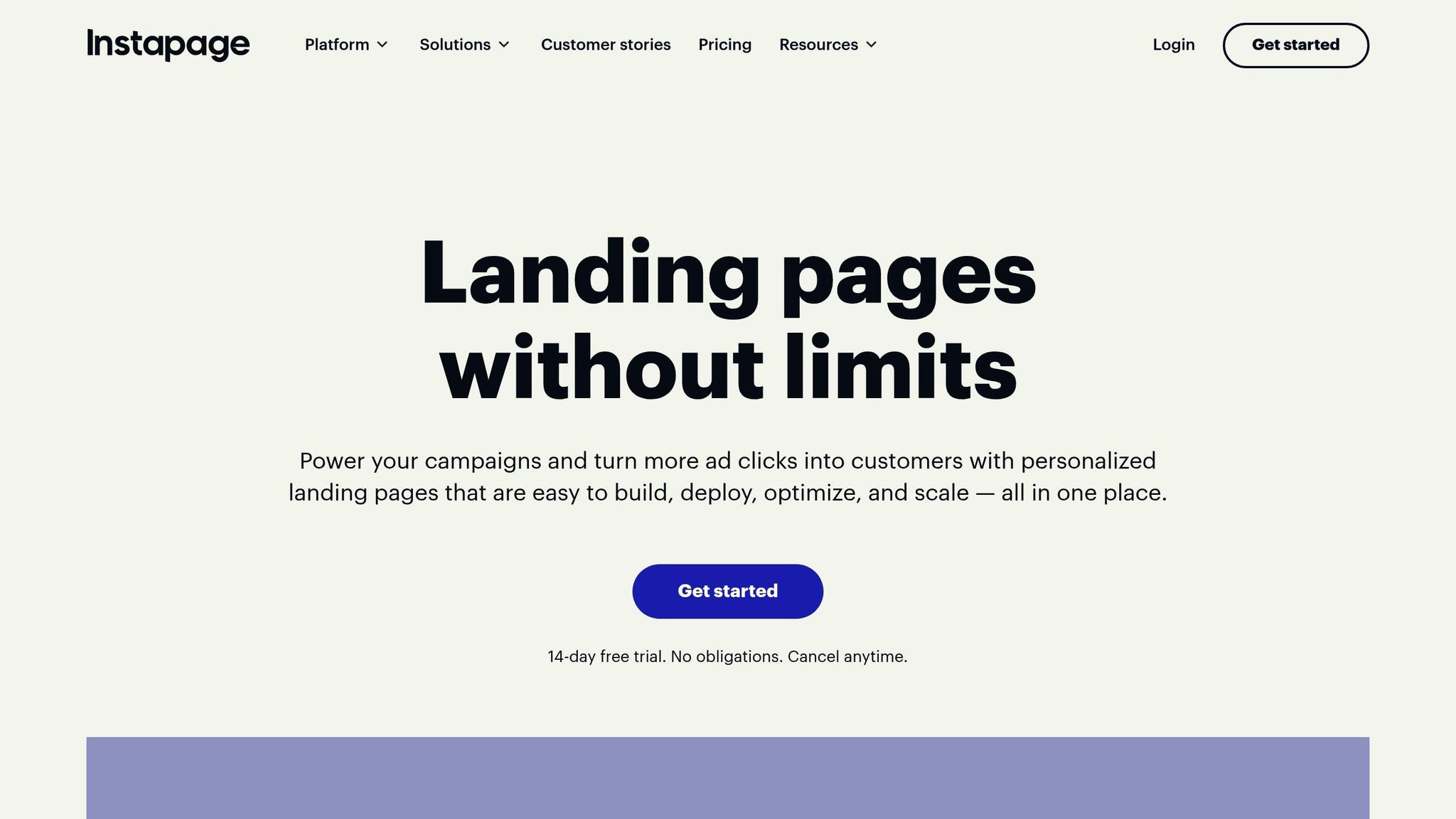
Instapage offers businesses in the U.S. the ability to create highly personalized landing pages designed to match visitor characteristics. By tailoring content to individual needs, the platform helps increase engagement and improve ROI for American companies.
Instapage uses AI to craft landing pages that align closely with visitor intent. It goes beyond basic customization by tailoring copy to specific data points like keywords, firmographics, and demographics. This approach has proven effective, with B2B brands reporting an average 80% increase in conversion rates when using personalized web experiences.
One standout feature is dynamic text replacement, which automatically adjusts page content based on the visitor's traffic source. For example, a user clicking on an ad for enterprise software will land on a page specifically tailored to that audience.
Instapage also utilizes real-time visitor data to enhance performance continually. Eargo, a hearing aid company, leveraged these features to boost customer acquisition by 20% by aligning unique landing pages with specific ad campaigns. This ensured consistent messaging across the customer journey.
"Instapage has truly maximized our digital advertising performance by enabling us to offer matching, personalized experiences for every ad and audience. Now we can scale our landing page experiences as efficiently and effectively as we scale the ads themselves." – Darren Lepke, Marketing Director
Instapage simplifies optimization with AI-driven experiments that analyze ad traffic and automatically redirect it to the best-performing page variations. This feature eliminates the guesswork, while generating and testing different content elements like headlines, text, and call-to-action buttons.
The platform also includes built-in heatmaps, providing insights into visitor behavior to guide further improvements.
Several companies have seen impressive results through these tools. For instance, Lattice increased ad conversion rates by 41%, HelloFresh reduced landing page production time by 33%, and Evolve achieved up to an 89% conversion rate boost across Facebook and Google campaigns.
"Instapage gives us the ability to tailor our landing page content and layout to tell a unique story for each geographical target. The platform also enables us to create different variations with content that performs well for each unique channel. Every marketing team needs this!" – Tamar Friedland, Sr. Director of Global Paid Marketing
These optimization tools integrate seamlessly with a variety of tools commonly used by U.S. businesses.
Instapage connects with over 120 applications, including widely-used email platforms, CRMs, e-commerce tools, and marketing automation systems. These integrations allow businesses to streamline lead management, improve conversions, and enhance customer experiences. Moreover, the platform adheres to strict data protection standards like GDPR, SOC 2, and CCPA, ensuring compliance with privacy regulations.
Instapage templates are designed to work flawlessly on mobile devices, automatically adjusting to different screen sizes. The platform’s AI also takes mobile-specific user behavior into account when creating and testing page variations. This focus on mobile optimization has led to 34% higher conversion rates and reduced acquisition costs by directing targeted ads to relevant landing pages.
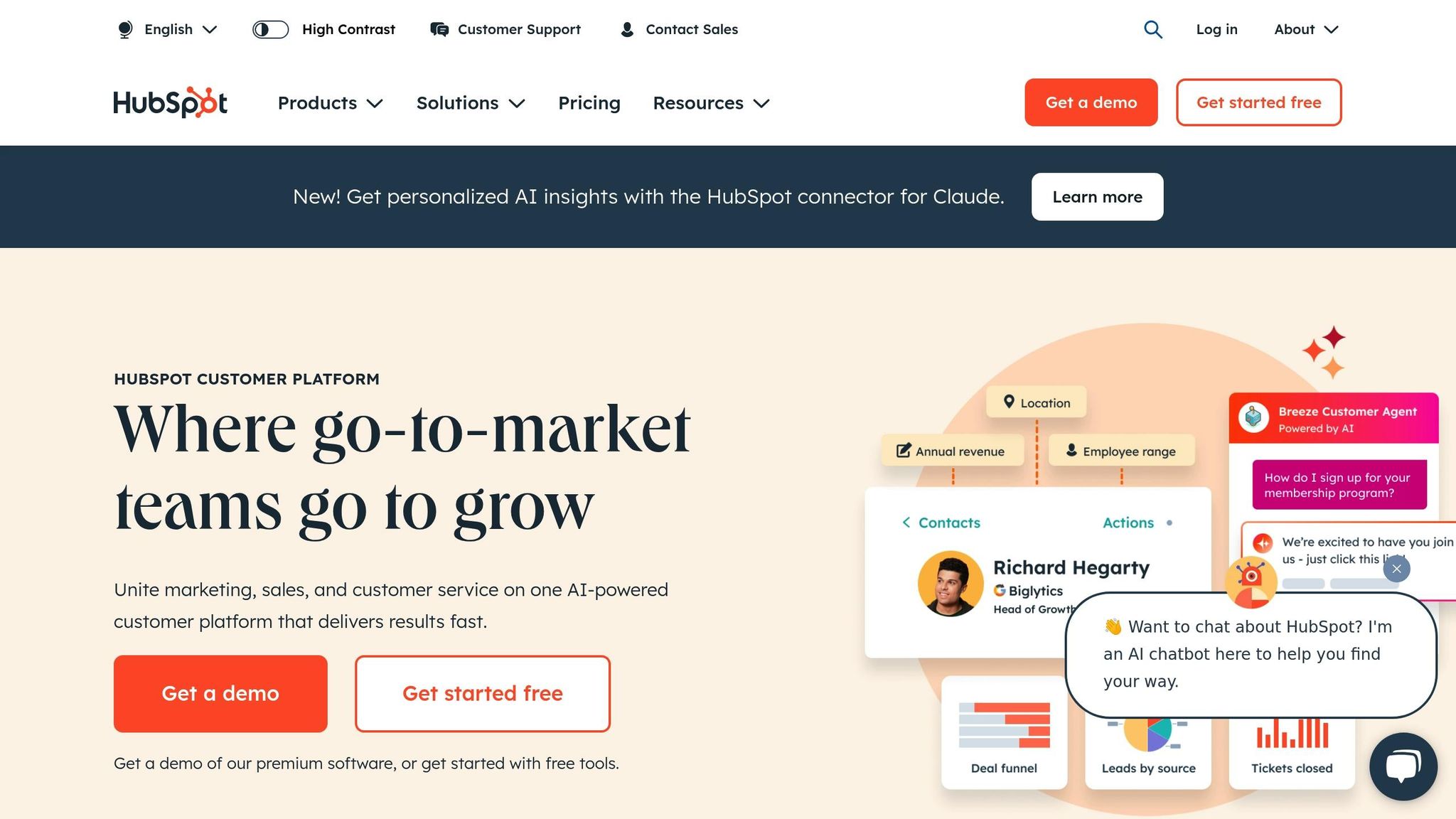
HubSpot's AI Website Builder takes the concept of AI-powered templates to the next level by combining artificial intelligence with advanced business tools. This platform creates websites that adjust to visitor behavior in real time, helping businesses across industries in the U.S. improve user engagement and boost conversion rates through personalized experiences.
HubSpot's AI uses advanced data analysis to deliver tailored website experiences. By employing customer segmentation algorithms, the platform organizes visitor data quickly, allowing businesses to present content that aligns with individual interests, behaviors, and preferences.
The system’s predictive tools recommend products and content based on past customer interactions. For instance, 96% of marketers say personalization leads to repeat purchases, while 94% report that it directly increases sales.
"Personalized content is no longer optional. It's a competitive differentiator. Personalization transforms the customer experience from generic to unforgettable. When users feel like a brand understands them and their needs, they're more likely to engage, purchase, and be loyal."
- Mike Ford, CEO of Skydeo
Dynamic content is another standout feature. For example, a beauty brand could use an AI-powered quiz to help users find their ideal foundation shade. After answering a few questions, the system provides tailored product recommendations to meet each visitor's unique needs.
With 71% of consumers expecting personalized interactions, HubSpot’s AI ensures businesses can meet these demands efficiently.
"The biggest benefit of using AI to personalize website and marketing content is that AI enables hyper-personalization at scale."
- Mike Ford, CEO of Skydeo
HubSpot's Content Hub simplifies website optimization through automated A/B testing. This eliminates the trial-and-error approach, allowing businesses to test multiple design elements, layouts, and content combinations simultaneously to see what resonates most with visitors.
The AI analyzes test results in real time and automatically applies the winning variations as the default. This ongoing process ensures that websites continually improve based on actual visitor behavior and preferences.
For example, HubSpot’s A/B testing evaluates elements like images, text, layouts, and forms, using real-time data that includes SEO performance, engagement rates, and conversion metrics. This constant refinement keeps the user experience optimized and aligned with the latest visitor insights.
HubSpot goes beyond website optimization by integrating tools tailored for U.S. businesses. Its built-in payment processing system, HubSpot Payments, supports credit and debit cards, Apple Pay, Google Pay, and ACH direct debit, making it easy to handle both one-time and recurring payments.
The platform also offers a CRM that automates essential tasks like data entry and marketing outreach. With the CRM market projected to grow to $128.97 billion by 2028, HubSpot enables businesses to manage data seamlessly while staying competitive.
Additionally, HubSpot connects with hundreds of third-party apps, allowing companies to integrate AI-powered website features without disrupting their existing toolsets. This flexibility is vital, especially as 65% of sales organizations now use CRM systems, up from 59% in 2018.
For businesses with specific payment needs, HubSpot integrates smoothly with platforms like Stripe, ensuring compatibility for various requirements and locations.
In today’s mobile-first world, HubSpot’s AI ensures websites are fully optimized for all devices. With 67% of U.S. consumers using their bank’s mobile app in 2021 and 41% identified as "digital-only", a mobile-friendly experience is critical for driving conversions.
The platform’s responsive design algorithms adapt websites to any screen size while maintaining a personalized user experience. By analyzing mobile-specific behavior patterns, the AI creates and tests page variations that perform seamlessly across different devices, ensuring a smooth experience for every visitor.
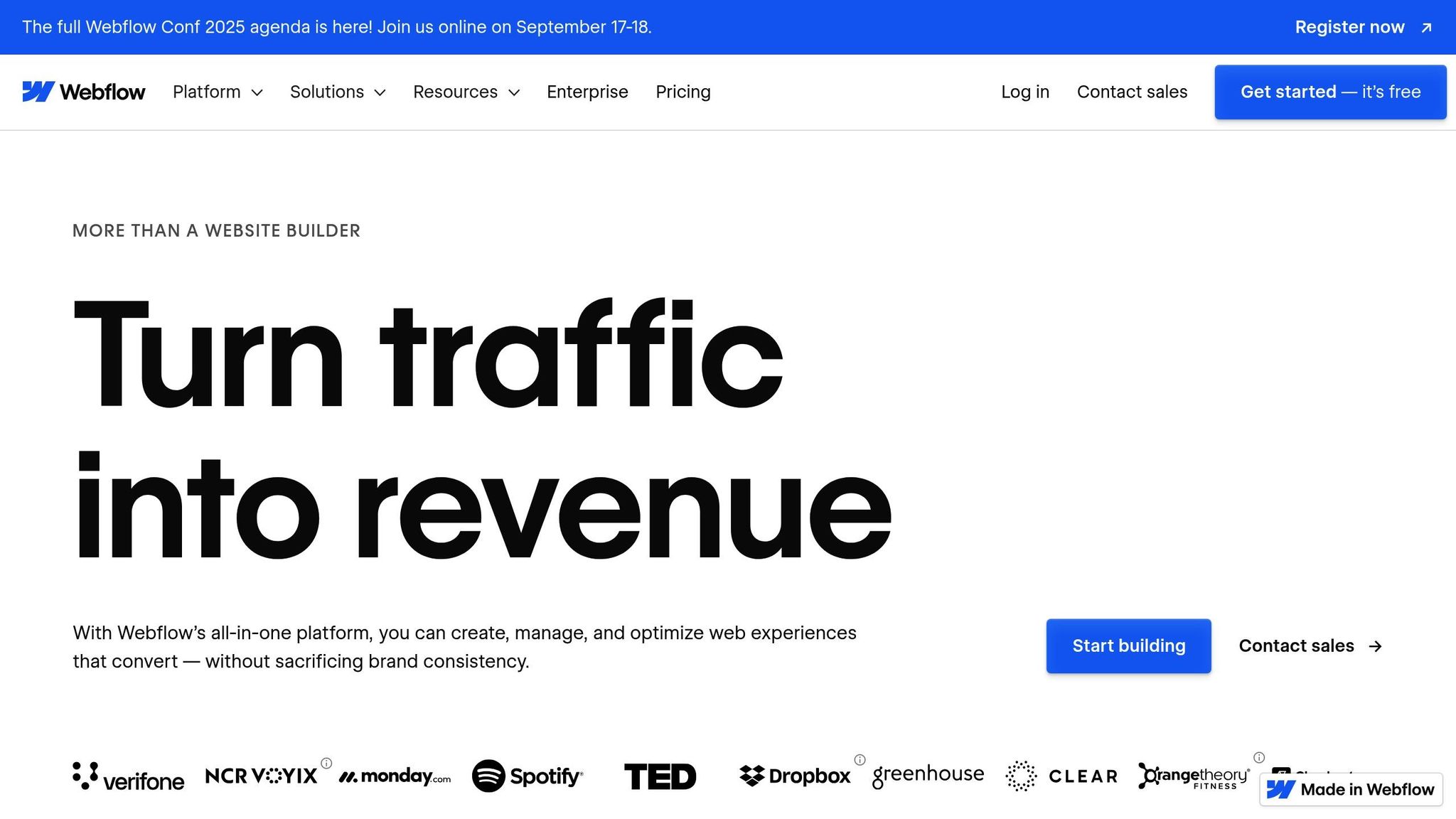
Webflow's Layout Generator takes website design to the next level by combining visual creativity with smart automation. Designed for U.S. businesses, this tool empowers users to craft websites that not only look great but also adapt to how visitors interact with them. Unlike traditional website builders, Webflow's AI zeroes in on visitor behavior, fine-tuning layouts to boost conversion rates while keeping designers in full control.
Webflow's AI system dives deep into visitor behavior - tracking things like the pages they explore, how long they stay, and their interactions on the site. With this data, it creates detailed visitor profiles and uses them to make real-time adjustments. For example, it can move call-to-action buttons to more effective spots or suggest content that matches a visitor’s interests, such as blog posts or specific product categories.
For e-commerce sites, this gets even better. Webflow’s AI can display tailored product categories to returning shoppers based on what they’ve browsed before. Think of it as a virtual store assistant, always ready to show what’s most relevant to each customer.
The system doesn’t stop there. It uses machine learning to predict what each visitor might want next, constantly refining the experience to make content more relevant over time.
Webflow also integrates seamlessly with popular analytics tools like Segment and Heap, supports AI-driven search through platforms like Algolia or Swiftype, and works with recommendation systems such as Amazon Personalize or Monetate. These integrations make it easier for businesses to personalize user experiences and measure the impact of their strategies.
To top it off, Webflow provides detailed analytics on user engagement and conversion rates. This allows businesses to track their ROI and fine-tune their approach for even better results.
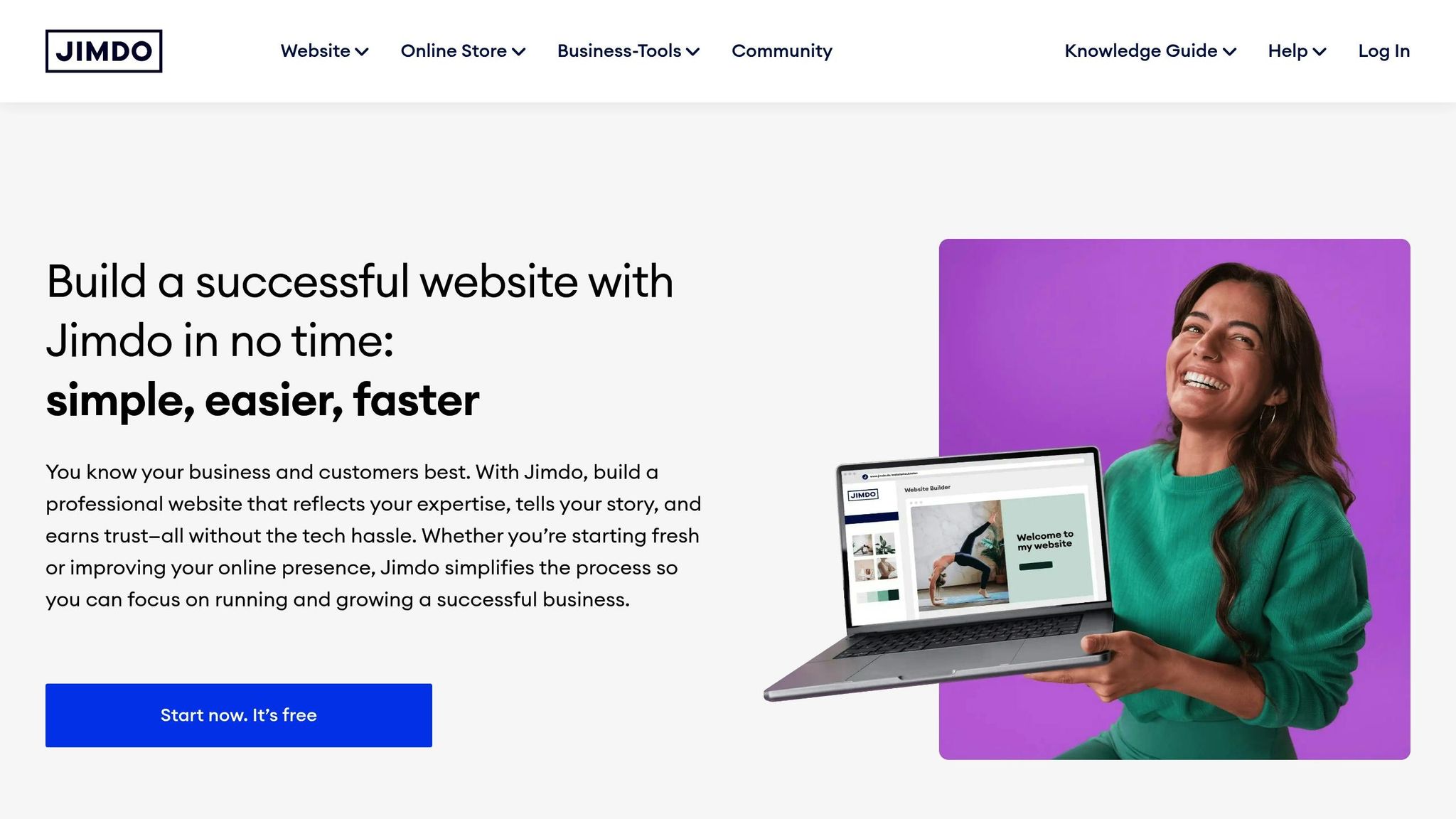
Jimdo Dolphin is a website builder powered by AI that promises to create a personalized website in just three minutes. Using a conversational setup, it gathers details about business goals, project scope, and design preferences to deliver a tailored solution [85,86].
Jimdo Dolphin’s AI engine simplifies the website creation process with an interactive setup. It asks targeted questions about your business, audience, and design preferences, then generates a custom website complete with optimized content and images.
But it doesn’t stop at basic customization. Dolphin’s built-in assistant takes care of SEO tasks automatically. It analyzes your site’s performance and offers actionable suggestions to improve search rankings. These recommendations are tailored to your website’s unique needs, ensuring ongoing optimization based on performance data.
Paul Seiffert, Team Lead of Infrastructure Engineering at Jimdo, explains how their focus on performance benefits users:
"With Fastly, we improve our customers' user experience significantly, so we also make their business more successful by delivering their websites quickly."
Seiffert also highlights the importance of image optimization in creating high-performing sites:
"In the website creation world, performance is key, and the images are definitely one of the most important pieces of a website... We used to have a manual process to resize images, but now we use Fastly's Image Optimizer to dynamically resize images, guaranteeing optimized site performance for a great end user experience."
Jimdo Dolphin makes it easy for businesses in the US to integrate essential tools through its Smart Apps feature. By simply copying and pasting URLs, users can connect with popular services like Calendly, Google tools, Twitter, and Canva.
For e-commerce, Dolphin supports trusted payment processors, including PayPal and Stripe, without adding extra transaction fees. Businesses only pay the standard processing fees, keeping more of their revenue [95,96]. For those needing additional features, Dolphin works with POWR plugins to expand website functionality - no technical expertise required.
To help businesses reach more customers, Jimdo Dolphin ensures that all websites are mobile-responsive and meet WCAG 2.1 Level AA standards, addressing both legal and practical accessibility needs.
Jimdo emphasizes its dedication to accessibility:
"At Jimdo, we are committed to ensuring that everyone - regardless of ability - can use our products and services."
While Jimdo provides tools to support accessibility, it acknowledges that compliance with global accessibility laws isn’t guaranteed. For businesses aiming to create accessible websites, Jimdo offers a detailed checklist that includes using readable fonts, adding descriptive alt text to images, ensuring proper color contrast, and testing sites on various devices. They also recommend user testing with individuals who have disabilities to gather practical feedback on accessibility.
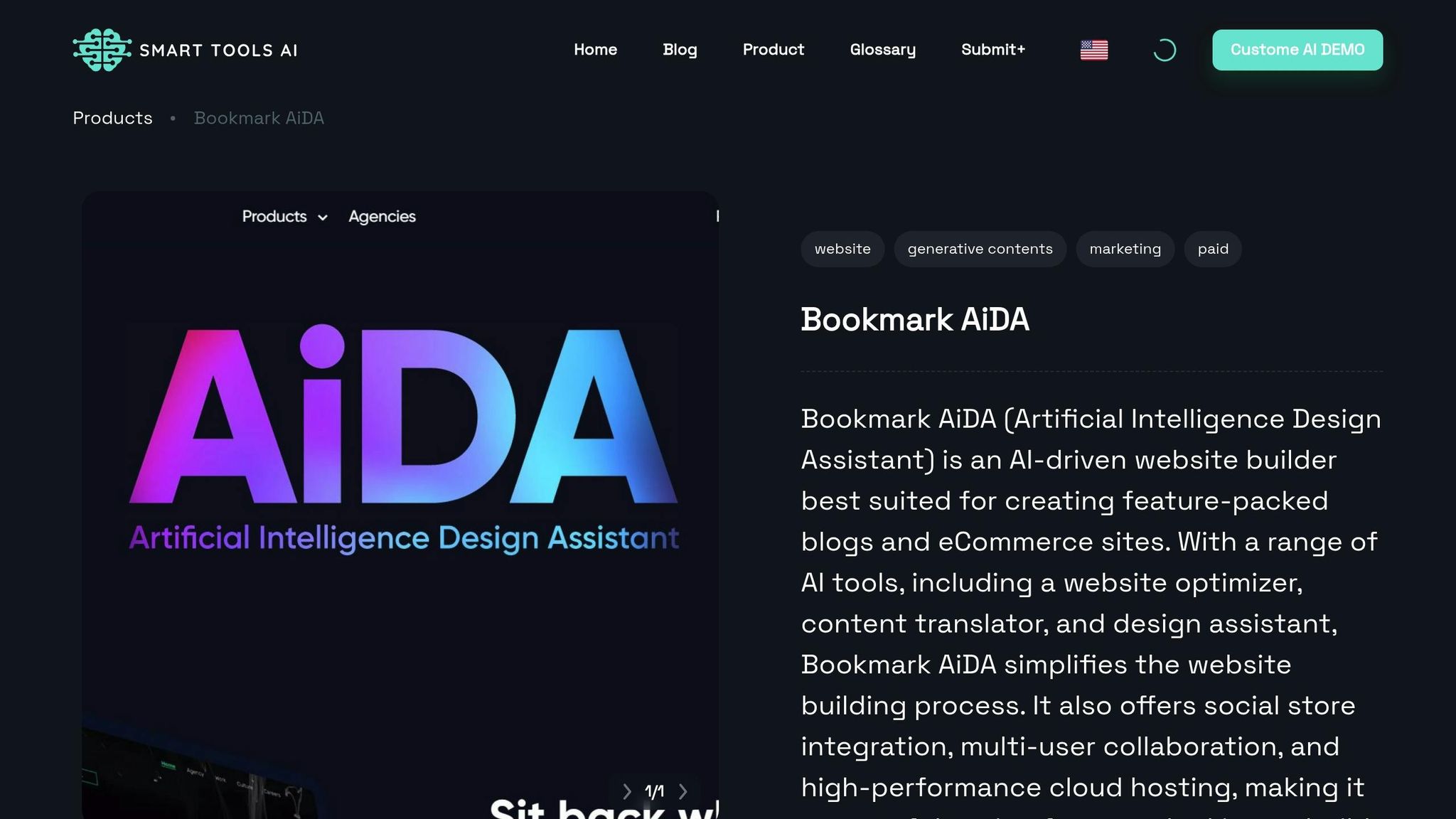
When it comes to AI tools that can transform website conversion rates, Bookmark AIDA makes a strong impression with its focus on design and data-driven strategies. By asking precise questions, AIDA analyzes millions of layout possibilities to craft unique, conversion-focused website designs. With over 40,000 businesses already using the platform, it’s clear that AIDA can deliver professional websites that help boost results.
AIDA acts as more than just a tool - it’s like having a personal design partner. Through an interactive questionnaire, it gathers details about your business goals, audience, and style preferences. The AI then uses this information to create a fully customized website that aligns with your brand’s identity. Once the initial design is ready, you can tweak it further using a simple drag-and-drop editor. What’s more, AIDA’s machine learning capabilities allow it to improve its design suggestions based on how users interact with the platform.
One standout feature of Bookmark AIDA is its built-in A/B testing. This allows the platform to automatically test and refine design elements based on real-world performance data. It also takes care of SEO best practices, ensuring your site is optimized for search engines right from the start. This means better visibility and the potential to draw more organic traffic.
For businesses in the US, Bookmark AIDA offers integrations with major platforms like Facebook, Instagram marketplaces, Google Shopping, and eBay through its social store features. It also supports various third-party tools commonly used by US businesses. However, email functionality is limited to three addresses per account. Pricing is straightforward: the Business plan at $29.99/month unlocks full online store capabilities, while the Professional plan at $14.99/month covers standard website needs.
Every website created with Bookmark AIDA is automatically optimized for mobile devices. With unlimited storage and bandwidth provided through high-performance cloud hosting, your site will load quickly and deliver a smooth experience on any device. This is a crucial factor in keeping visitors engaged and improving conversion rates.
Users often highlight how easy the platform is to use, with many reporting that they can build a fully functional, professional website in just minutes. The platform’s user satisfaction speaks volumes, earning an average rating of 4.6/5 on both Capterra and Software Advice. Up next, we’ll dive into another AI-driven tool that’s reshaping the future of website design.
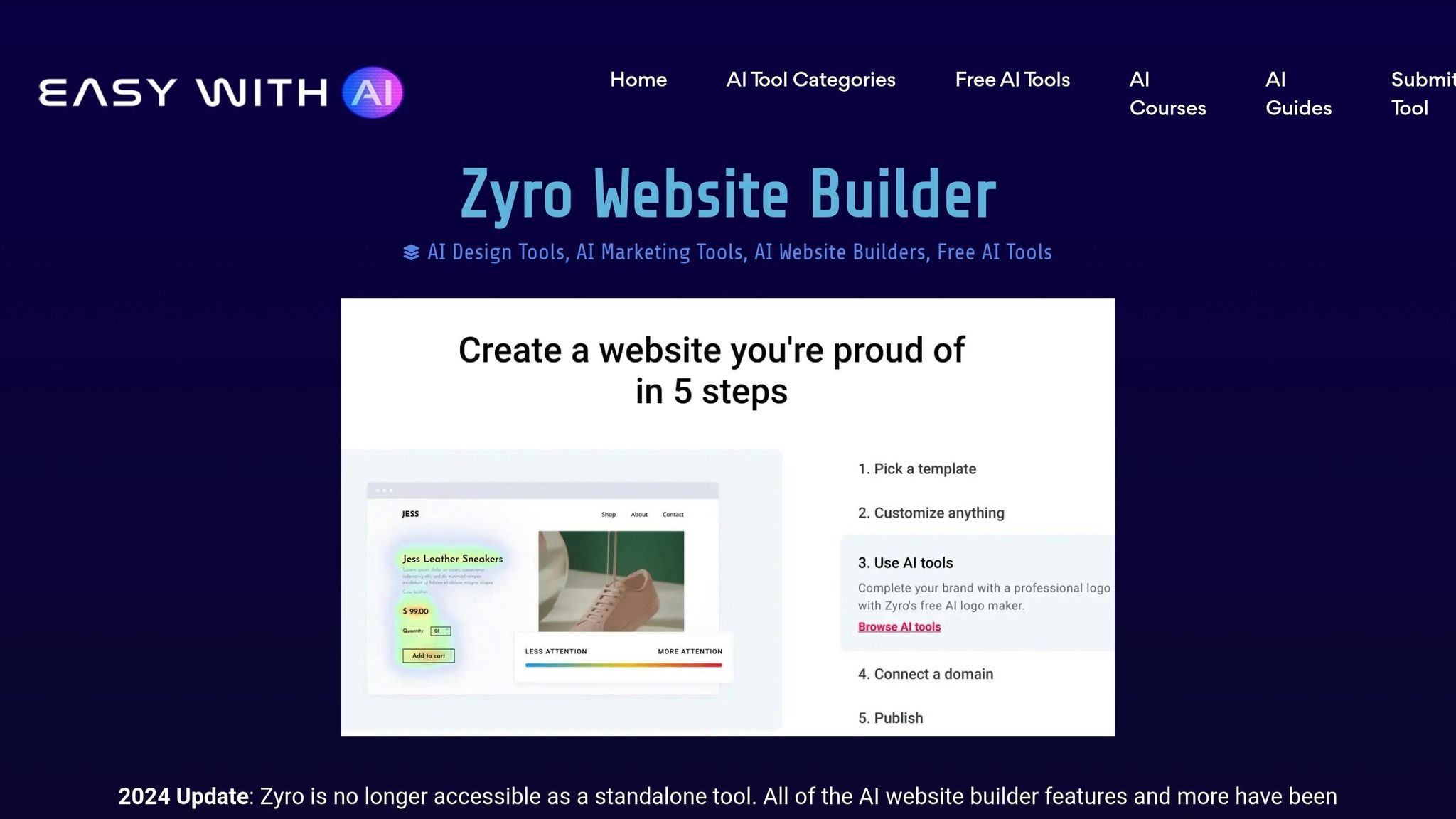
Since December 2023, Zyro AI Website Builder has been providing a range of AI-driven tools designed to make website creation easier while delivering tailored, conversion-friendly experiences. Entrepreneurs can benefit from its smart automation and practical business tools to enhance their online presence.
Let’s take a closer look at what makes Zyro stand out, from its AI-powered features to mobile optimization and seamless integrations.
Zyro’s AI tools offer much more than just basic templates. They include layout optimization, intelligent image selection, and automated generation of SEO-friendly copy. With its AI content writer, you can create entire pages of optimized content based on the information you provide. It also simplifies creative tasks with generators for business names, slogans, and blog titles.
"The templates are easy to work with and the AI tools are a good complement" – Manuel, Zyro User
This seamless integration ensures your website feels unified and directly appeals to your target audience.
Zyro ensures your site performs well on mobile devices, with pages loading in just 790ms - far faster than the industry average of 5–10 seconds. A dedicated mobile editor and preview feature let you fine-tune and review the mobile version of your site. For accessibility, Zyro makes it simple to add alt text to images and includes SSL certificates along with GDPR compliance tools.
Zyro works with popular platforms like Google Analytics, Facebook, and Instagram, while offering essential e-commerce functionalities such as order tracking, catalog management, tax calculations, and CRM tools. Payment options include Stripe on the Business plan and over 70 choices on the Online Store plan.
"Also, their logo maker and AI writer really help fill out the website content if you're having trouble." – Salim, Zyro User
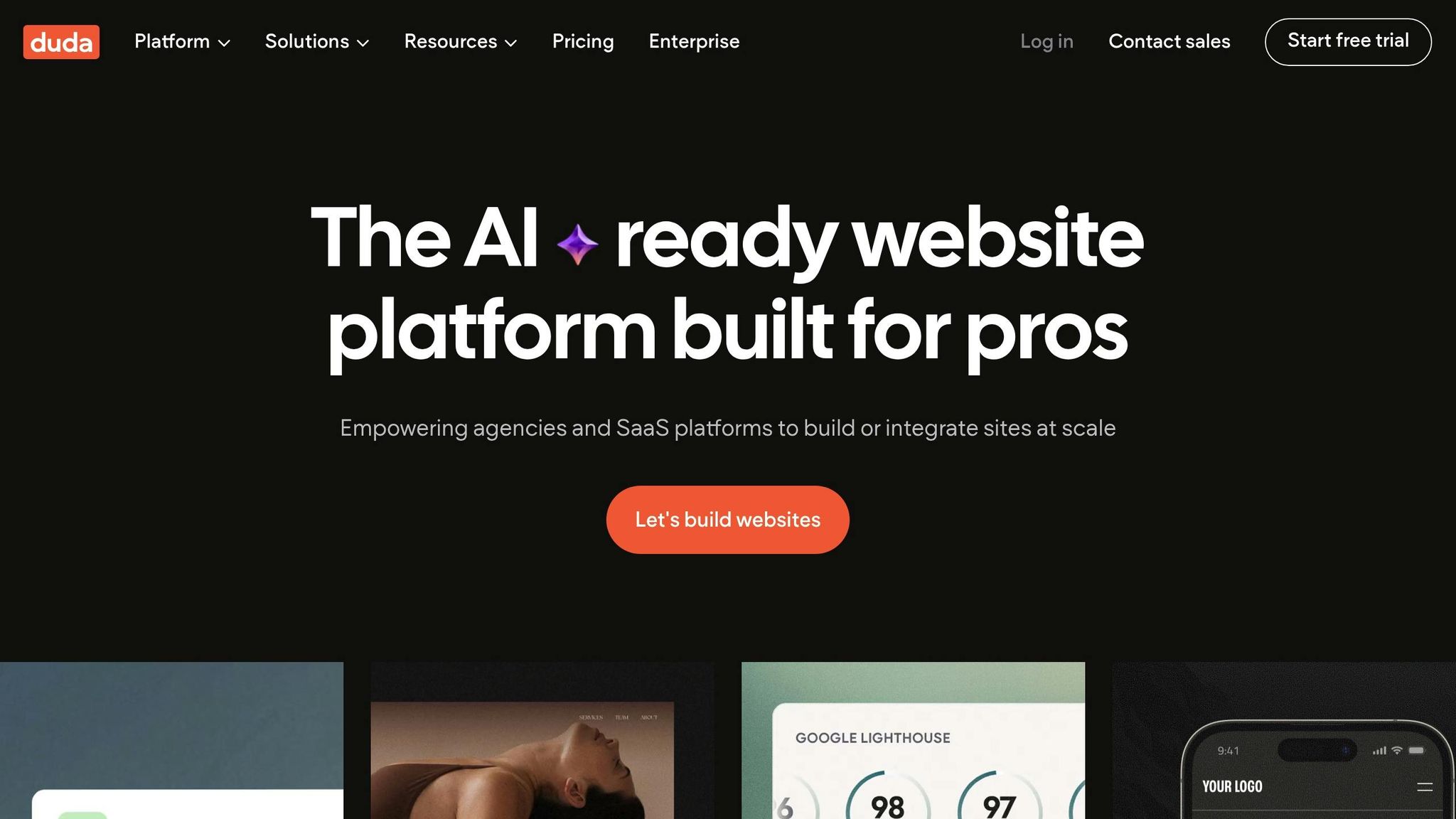
Duda AI-Powered Templates provide a practical solution for agencies and businesses managing multiple locations. By using advanced AI-driven tools, Duda simplifies website creation while maintaining consistent branding across diverse local markets. These templates make it easier to manage complex website needs without compromising on high conversion standards.
Duda's AI Assistant uses advanced models combined with website-specific data to deliver highly relevant content suggestions. This AI-driven approach enables the creation of dynamic content tailored to local market demands, all while ensuring brand consistency. By leveraging unique business details, the AI Assistant generates contextual content that resonates with local audiences. For instance, Janis Digital used Duda's AI tools to address branding inconsistencies and duplicate content across multiple locations, resulting in a 40% boost in conversion rates on location-specific pages.
Although Duda's A/B testing capabilities receive a G2 rating of 6.8/10, the platform compensates with robust automated optimization tools designed to improve performance and user experience. Impressively, 94% of Duda sites achieve "Good" Core Web Vitals scores, reflecting its technical reliability. Beyond content creation, Duda's AI features handle tasks like generating and editing text, enhancing SEO, suggesting new pages, refining design, building custom widgets, and even launching entire multi-page sites. These automated optimizations deliver performance metrics that are 51% above the industry average.
Duda integrates seamlessly with a variety of tools commonly used by US-based businesses, making it easy to align websites with existing workflows. The platform supports popular CRM systems like HubSpot, Salesforce, and Zoho. For payment processing, Duda works with gateways such as Stripe and PayPal. Additionally, email marketing tools like Mailchimp and Active Campaign, along with analytics platforms like Google Analytics, are fully compatible.
| Integration Category | Available Tools |
|---|---|
| CRM Systems | HubSpot, Salesforce, Zoho |
| Payment Gateways | Stripe, PayPal |
| Email Marketing | Mailchimp, Active Campaign |
| Analytics | Google Analytics |
| Automation | Zapier, ServiceTitan |
Zapier integration further enhances workflow automation by connecting Duda with other business applications . For example, Duda integrates with ServiceTitan via Zapier to automatically generate new leads from form responses. As Joseph Ashby, President of River Avenue Digital, puts it:
"Duda has helped us streamline our workflow, build faster, more secure websites, and deliver a better experience for our clients (and our team)."
Duda ensures that its templates deliver a smooth experience across devices. Built with mobile-first principles, these AI-powered templates are optimized for performance on smartphones, tablets, and desktops alike. By prioritizing mobile responsiveness, Duda guarantees a seamless user experience no matter how visitors access the site.
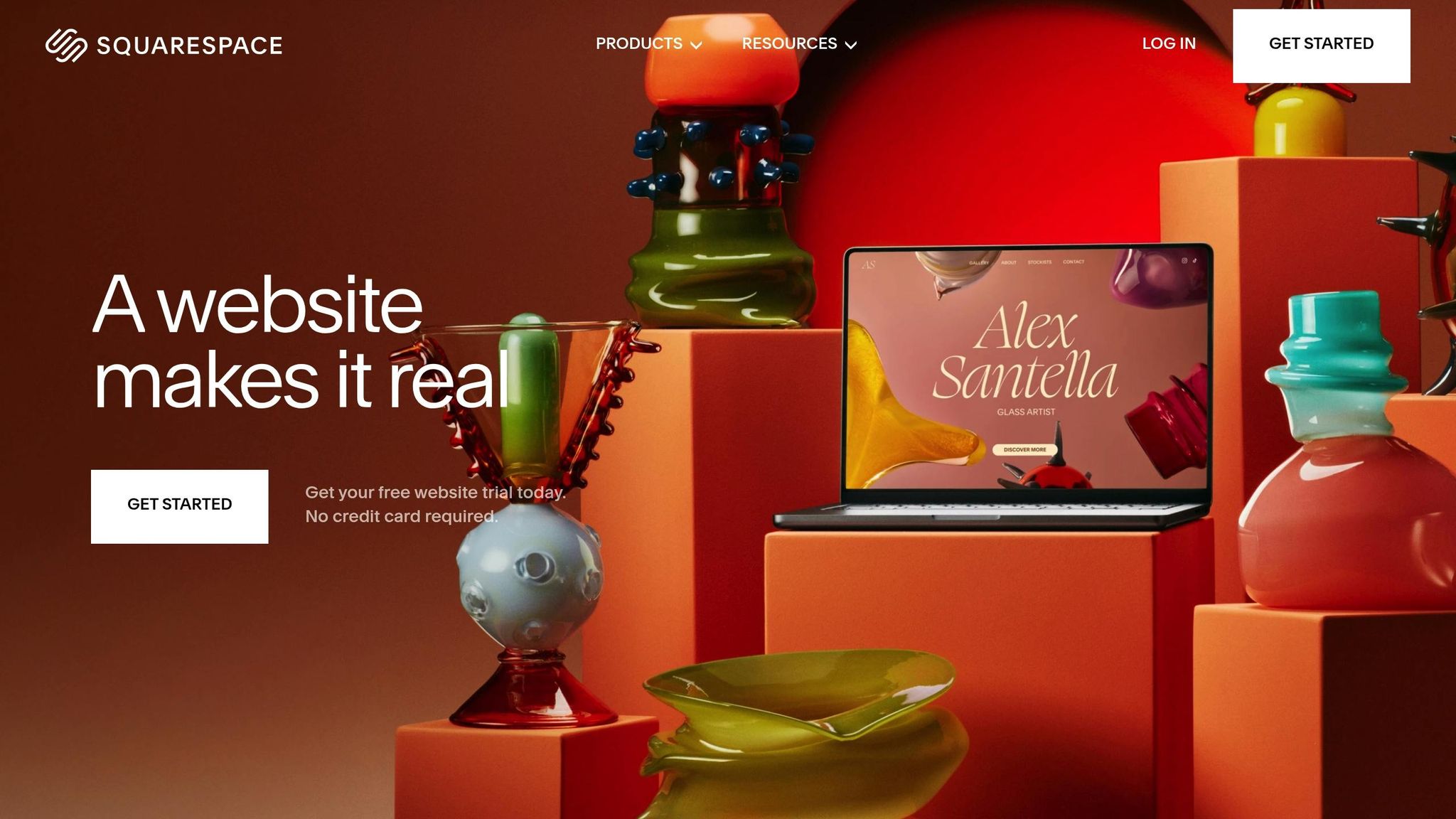
Squarespace AI Layouts bring a personalized touch to website design, adapting to visitor preferences in real-time. These AI-driven templates analyze user behavior and fine-tune content to create engaging experiences that encourage meaningful interactions and conversions.
With Squarespace's AI engine, websites deliver tailored experiences by studying visitor behavior and demographics. This means content and product recommendations are dynamically adjusted based on browsing habits. For example, a clothing retailer saw a 25% increase in average order value, while a local bakery boosted online orders by 30%. Additionally, the platform's AI-powered chatbots enhance lead generation by offering personalized suggestions. This level of customization aligns with what modern consumers expect, making dynamic personalization a key driver of success for businesses.
Squarespace AI Layouts integrate effortlessly with tools that are essential for businesses in the US. For instance, its native Squarespace Payments system supports direct transactions in key markets, including the US. It also connects with popular CRM platforms like Clarify, helping businesses streamline customer insights. As Anthony Casalena, Founder and CEO of Squarespace, puts it:
"Today's entrepreneurs want a frictionless experience, more ways to sell, superior design and better outcomes when it comes to building a presence and running a business online."
Squarespace AI Layouts are designed to perform seamlessly on mobile devices, with features like automatic content adjustments and built-in accessibility tools such as keyboard shortcuts and alt text support. The Fluid Engine website builder allows users to customize mobile layouts separately from desktop versions, ensuring smooth performance and avoiding layout issues. These features also help businesses meet accessibility standards, offering a more inclusive user experience.
Picking the right AI website template means understanding how each platform measures up in terms of features, usability, and compatibility with U.S. business needs. The table below breaks down the essential details, including AI tools, conversion features, ease of use, and more.
| Template | AI Features | Conversion Tools | Ease of Use | Ideal Business Type | US Market Ready | Currency Support | Compliance Features |
|---|---|---|---|---|---|---|---|
| God of Prompt Conversion Accelerator | 30,000+ AI prompts & custom toolkit | Conversion-optimized prompts with lifetime updates | Beginner-friendly | Marketing agencies, content creators | Yes | USD ($) | |
| Unbounce Smart Builder | AI-powered design adjustments | Optimized conversion tools | User-friendly | Lead generation campaigns | Yes | USD ($) | |
| Leadpages AI Templates | AI-driven copywriting & analytics | Conversion tracking & split testing | Easy | Small businesses, coaches | Yes | USD ($) | |
| Wix ADI | Automated design intelligence | Built-in analytics & form integrations | Very easy | Individuals, small businesses | Yes | USD ($) | |
| Shopify AI-Optimized Storefronts | Product recommendation & inventory management AI | Checkout optimization features | Moderate | E-commerce stores | Yes | USD ($) | |
| ClickUp CRO Prompts Template | Task automation & project management AI | Performance tracking dashboards | Easy | Project teams, agencies | Yes | USD ($) | |
| Taskade CRO Checklist | Workflow automation & smart templates | Progress tracking & collaboration tools | Easy | Remote teams, consultants | Yes | USD ($) | |
| Instapage AI Landing Pages | AI content generation & personalization | Conversion analytics & heatmaps | Moderate | Digital marketers | Yes | USD ($) | |
| HubSpot AI Website Builder | Smart content creation & predictive lead scoring | CRM integration & email automation | Easy | B2B companies, sales teams | Yes | USD ($) | |
| Webflow AI Layout Generator | Visual AI design & CMS automation | Custom interactions & SEO tools | Advanced | Designers, agencies | Yes | USD ($) | |
| Jimdo Dolphin | Logo creation & content suggestions | Store analytics & SEO optimization | Very easy | Local businesses, freelancers | Yes | USD ($) | |
| Bookmark AIDA | AI-driven design & content creation | E-commerce tools & appointment booking | Easy | Service businesses | Yes | USD ($) | |
| Zyro AI Website Builder | AI copywriting & logo maker | Heat mapping & visitor analytics | Easy | Startups, personal brands | Yes | USD ($) | |
| Duda AI-Powered Templates | Client management & automation | Team collaboration & billing features | Moderate | Agencies, web professionals | Yes | USD ($) | |
| Squarespace AI Layouts | Personalized content creation & dynamic features | Built-in analytics & email marketing | Easy | Creatives, small businesses | Yes | USD ($) | Data Privacy Frameworks |
The table shows how templates vary in functionality, cost considerations, and scalability. For example, Squarespace offers a 20% discount on annual plans, plus free domain registration for the first year. All templates are compatible with USD and meet U.S. data privacy standards. Squarespace, in particular, ensures compliance with Data Privacy Frameworks for businesses handling international data transfers.
AI features differ widely, from basic automation to advanced personalization. Some templates, such as Shopify, focus on e-commerce tools, while others like HubSpot and Webflow cater to B2B and design-driven needs, respectively. These distinctions make it easier to align the template with your specific business goals.
Scalability is another critical factor. Platforms like Webflow, which supports over 3 million sites, demonstrate how templates can help businesses grow efficiently. As one user shared:
"We're saving upwards of $6 million a year with Webflow, and we've reinvested those savings in other areas like website optimization and localization… that's been really powerful."
Tailored solutions for industry-specific needs also stand out. For instance, templates like Better AI focus on image enhancement, while Saa-Ai and FlowAi specialize in AI-driven copywriting and content creation. These insights highlight how choosing the right template can directly contribute to your business's growth and success.
Picking the right AI website template goes far beyond just choosing a design that looks good. It’s about finding a template that aligns with your business goals, industry needs, and long-term growth plans.
Start by considering how the template fits your business model. Templates are often ideal for informational websites, blogs, portfolios, or small businesses. For e-commerce, platforms like Shopify offer AI-optimized templates tailored for online stores. On the other hand, service-based businesses might benefit from templates with custom pricing options and specialized features.
Before committing, take advantage of trial periods offered by most providers. These trials let you test the platform’s design, usability, and performance to ensure it aligns with your brand’s vision and style. This initial step is crucial for determining if the template meets your industry’s unique needs.
Every industry has its own set of requirements when it comes to website design. A poor user experience can drive customers away, with 89% of users saying they’d switch to a competitor if a website doesn’t meet their expectations. Responsive design is particularly critical, as 73.1% of web designers cite non-responsive websites as a top reason for customer loss.
Your business model’s complexity also plays a role. As Kenny Kline from BarBend explains:
"To access advanced functionalities or additional features, you may need to purchase premium templates or pay for add-ons and plugins. For example, advanced sliders, eCommerce integrations, custom forms, membership systems, or specialized widgets."
Your website template should grow with your business, not hold it back. Scalability, system integration, data security, and regulatory compliance are all key factors to consider. Think about whether you’ll need to integrate third-party tools, such as CRMs, email platforms, or analytics software. A good AI template should seamlessly connect with your existing operations and unify your marketing strategies.
For instance, an AI-powered website template that integrates with your CRM can centralize customer data, making it easier to analyze and act on insights. This kind of integration ensures all your tools work together, saving time and boosting efficiency.
Compliance with US laws, especially the Americans with Disabilities Act (ADA), is a must. Non-compliance can lead to hefty fines - up to $150,000 per violation - and lawsuits. In 2023 alone, 4,605 web accessibility lawsuits were filed, marking a 42% increase from the previous year. Online stores were hit particularly hard, with 69% of these lawsuits targeting e-commerce websites.
To avoid legal issues, follow WCAG 2.1 Level AA guidelines, conduct regular accessibility audits, and ensure your website is compatible with assistive technologies. The Department of Justice considers websites public accommodations, meaning they must comply with ADA Title III.
Privacy laws like the California Consumer Privacy Act (CCPA) add another layer of responsibility. Businesses must map out how they collect consumer data, update privacy policies, and include features like a "Do Not Sell My Personal Information" link. Regular security audits and processes for handling user data requests are also essential.
When choosing an AI website template, prioritize ease of use and scalability. Start with a pilot program to test how the template performs in a controlled setting before rolling it out fully. Research potential vendors by looking at reviews and case studies to understand their reputation and reliability.
While off-the-shelf AI solutions might seem like a cost-effective option initially, custom solutions often prove smarter in the long run. They offer better scalability, security, and control over AI datasets, which can be critical as your business grows.
Ultimately, the right AI template isn’t just about meeting today’s needs - it’s an investment in your business’s future growth and compliance. Take the time to evaluate your options thoroughly, ensuring your choice supports both your current goals and long-term vision.
The move from standard website designs to AI-driven templates is more than just a tech upgrade - it's a game-changer for how businesses approach online success. Companies embracing AI-powered landing pages have reported an average 25% boost in conversion rates, proving these templates deliver results that matter.
Consumers are also raising the bar for personalization. A striking 73% prefer brands that tailor their experiences, and AI templates excel in meeting this demand. On the flip side, a poor website experience drives away 90% of visitors, who are unlikely to return. This underscores the critical need for a seamless user experience.
One standout feature of AI templates is their ability to automate A/B testing. This continuous optimization process has helped businesses achieve, on average, a 20% increase in conversion rates. By dynamically adjusting content and performance, these tools ensure websites are always at their best.
The momentum behind AI website technology is hard to ignore. The global market for AI landing page builders is projected to hit $1.4 billion by 2025, with AI use in marketing expected to grow by 53% in just two years. Early adopters are already seeing rewards, with revenue increases ranging from 3% to 15% and a sales ROI boost of 10% to 20%.
Personalization remains a big hurdle for many businesses. While 85% of users are more likely to convert on personalized landing pages, nearly half of businesses struggle with achieving their conversion goals. AI templates bridge this gap by delivering personalized experiences at scale, effortlessly.
Affordability is another key advantage. With AI website builders priced between $10 and $50 per month, businesses of all sizes can tap into advanced conversion tools without breaking the bank. The potential return on investment far outweighs the cost, making these solutions accessible to everyone.
As Stephen McClelland, Digital Strategist at ProfileTree, explains:
"In today's rapidly changing digital landscape, choosing a website template goes beyond aesthetics; it's about finding a scalable solution that meets your technical requirements and stays within your budget. This careful consideration sets the stage for long-term digital success".
Among the 15 templates highlighted, each offers distinct advantages. From God of Prompt's focus on boosting conversions to Shopify's e-commerce expertise, there's an option tailored to your business needs. Whether your goal is lead generation, driving sales, or enhancing user engagement, these AI-powered solutions are designed to deliver the results modern businesses need to thrive.
AI-powered website templates are changing the game when it comes to boosting conversion rates. By using advanced algorithms, these templates can build personalized and dynamic web pages that adjust to each visitor's behavior and preferences. Unlike static, old-school designs, this approach grabs attention and keeps users engaged.
With real-time data analysis, AI fine-tunes critical elements like headlines, images, and calls-to-action to ensure they resonate with visitors. On top of that, AI tools can quickly test and tweak designs, helping businesses figure out what works best to drive lead generation, user engagement, and sales growth.
AI-powered website templates make building websites faster and more efficient by automating tasks like layout design, content creation, and coding. This helps businesses save time and reduces the chances of mistakes, making it easier to get websites up and running quickly.
These templates go a step further by using AI to analyze user behavior and preferences. This means businesses can create personalized experiences that encourage more interaction and improve conversion rates. On top of that, AI tools help fine-tune website performance, improve SEO, and streamline workflows, ensuring users enjoy a smooth and engaging experience.
AI templates rely on responsive design principles to adapt layouts, images, and content automatically, ensuring your website looks and works perfectly on any device - be it a smartphone, tablet, or desktop. This approach guarantees a smooth user experience, no matter the screen size.
When it comes to accessibility, these templates come equipped with features like proper contrast ratios, keyboard-friendly navigation, and ARIA roles. By aligning with standards such as WCAG and ADA, they help create websites that are more inclusive and easier to use. Plus, by automating these elements, AI templates not only expand your audience but also help you meet both legal and ethical obligations.





